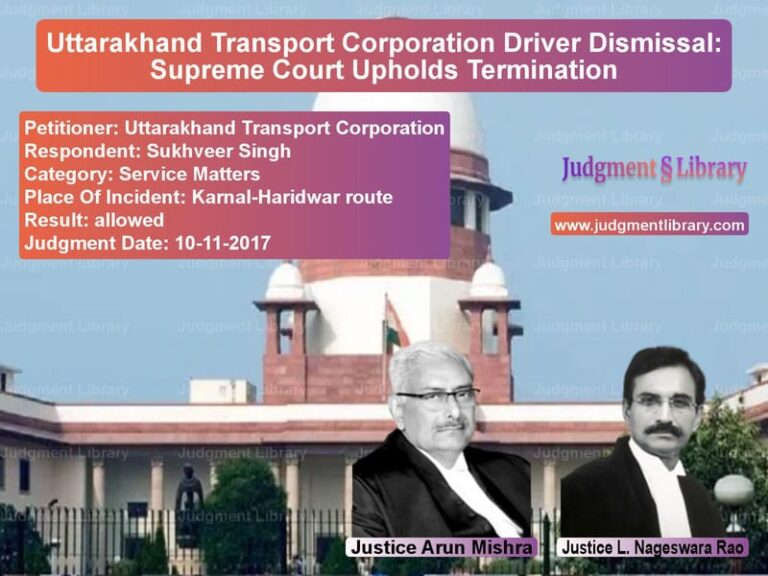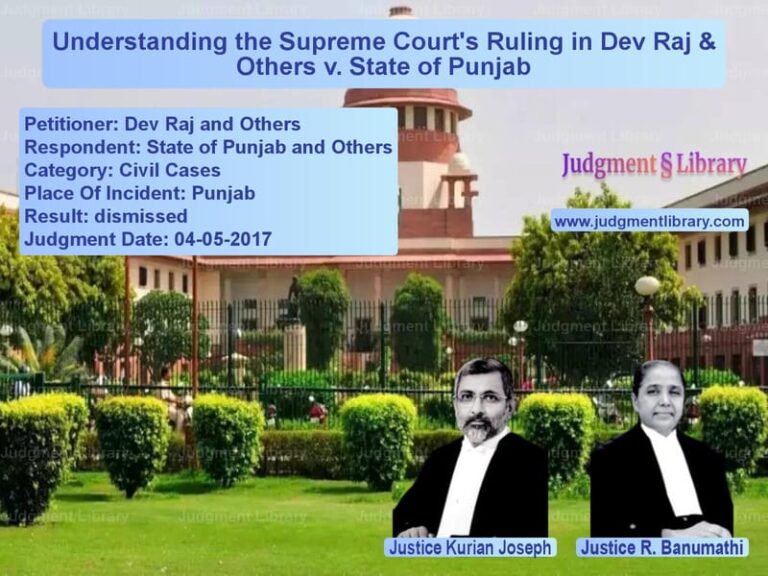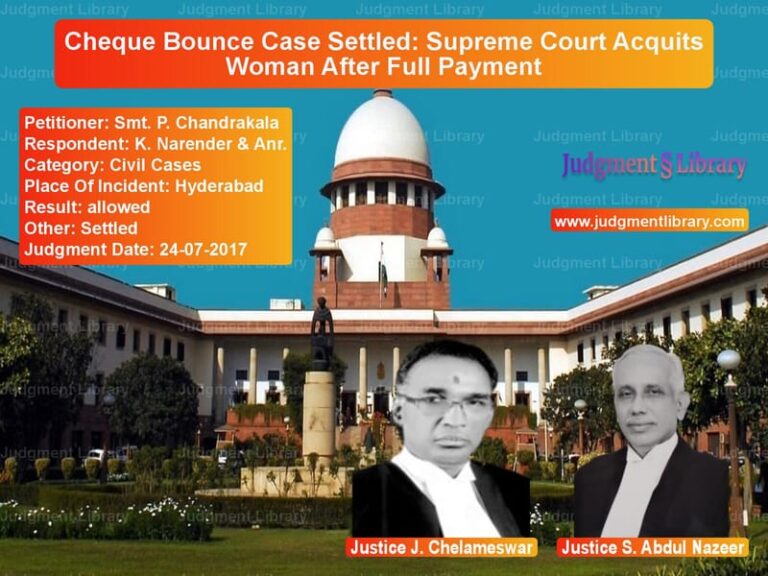Supreme Court Upholds Land Acquisition: Key Legal Principles Under the 2013 Act
The Supreme Court of India recently delivered a crucial judgment in the case of Delhi Development Authority vs. Rajender Singh & Ors., addressing the issue of land acquisition under the Right to Fair Compensation and Transparency in Land Acquisition, Rehabilitation and Resettlement Act, 2013. The case focused on whether an acquisition process could be deemed to have lapsed under Section 24(2) of the Act due to non-payment of compensation. The Court ruled in favor of the Delhi Development Authority (DDA), overturning the High Court’s decision and upholding the acquisition.
Background of the Case
The case originated from a dispute concerning land acquisition in Delhi. The respondents, Rajender Singh & Ors., had filed a writ petition in the Delhi High Court, claiming that the acquisition of their land had lapsed under Section 24(2) of the Act, 2013, as compensation was not paid in a manner recognized by law. The High Court, relying on the Pune Municipal Corporation vs. Harakchand Misirimal Solanki judgment, ruled in favor of the landowners, declaring the acquisition lapsed.
The Delhi Development Authority (DDA) challenged this ruling in the Supreme Court, arguing that compensation had been deposited in the Revenue Department (RD) due to disputes, and possession had already been taken over by the beneficiary department.
Petitioners’ Arguments
- The DDA argued that physical possession of the land had been taken on September 23, 1981, and the land had been transferred to the concerned department.
- They contended that compensation had been deposited in the Revenue Department due to ongoing disputes among landowners.
- The petitioners relied on the Constitution Bench judgment in Indore Development Authority vs. Manoharlal, which clarified that mere non-payment of compensation does not automatically lead to a lapse of acquisition.
- They asserted that the High Court had misinterpreted the law by relying on the now-overruled Pune Municipal Corporation judgment.
Respondents’ Arguments
- The landowners claimed that they had not received compensation, and therefore, the acquisition had lapsed under Section 24(2) of the Act.
- They argued that compensation must be directly paid to landowners and that depositing it in the Revenue Department did not fulfill legal requirements.
- The respondents maintained that the High Court had correctly applied the Pune Municipal Corporation precedent, which mandated direct payment.
Key Observations by the Supreme Court
The Supreme Court analyzed the case in light of the Constitution Bench ruling in Indore Development Authority and made the following observations:
- The Court ruled that acquisition does not lapse if either possession has been taken or compensation has been deposited, refuting the respondents’ argument.
- It emphasized that the word “or” in Section 24(2) must be read as “nor” or “and”, meaning that both conditions (non-payment and non-possession) must be met for acquisition to lapse.
- The judgment clarified that depositing compensation in the Revenue Department or Treasury is legally valid when landowners refuse to accept payment or if disputes exist.
- The Court ruled that the High Court had erred by following a now-overruled precedent and should have applied the law as laid down in Indore Development Authority.
Judgment
The Supreme Court ruled in favor of the DDA:
- The High Court’s decision was quashed.
- The acquisition was upheld, with no lapse under Section 24(2).
- The Court clarified that landowners can still claim compensation if unpaid, but it does not invalidate the acquisition.
Implications of the Judgment
This ruling has significant implications for land acquisition law:
- Clarification on Compensation Payment: The judgment confirms that depositing compensation in the Treasury satisfies legal requirements.
- Protection of Public Acquisitions: The ruling prevents the reopening of decades-old acquisitions based on technicalities.
- Guidance on Section 24(2) Interpretation: The Court provided a definitive interpretation, ensuring consistency in land acquisition cases.
- Preventing Frivolous Claims: The ruling discourages misuse of legal provisions to challenge long-settled acquisitions.
Conclusion
The Supreme Court’s decision in this case is a landmark ruling that upholds the principles of fairness and consistency in land acquisition law. By rejecting the claim of lapsed acquisition, the Court has reinforced legal certainty and ensured that public projects are not jeopardized by belated challenges. This judgment sets a precedent for future land acquisition cases, ensuring that legal provisions are interpreted in accordance with constitutional principles.
Petitioner Name: Delhi Development Authority.Respondent Name: Rajender Singh & Ors..Judgment By: Justice M.R. Shah, Justice C.T. Ravikumar.Place Of Incident: Delhi, India.Judgment Date: 24-02-2023.
Don’t miss out on the full details! Download the complete judgment in PDF format below and gain valuable insights instantly!
Download Judgment: delhi-development-au-vs-rajender-singh-&-ors-supreme-court-of-india-judgment-dated-24-02-2023.pdf
Directly Download Judgment: Directly download this Judgment
See all petitions in Property Disputes
See all petitions in Landlord-Tenant Disputes
See all petitions in Specific Performance
See all petitions in Damages and Compensation
See all petitions in Contract Disputes
See all petitions in Judgment by Mukeshkumar Rasikbhai Shah
See all petitions in Judgment by C.T. Ravikumar
See all petitions in allowed
See all petitions in Quashed
See all petitions in supreme court of India judgments February 2023
See all petitions in 2023 judgments
See all posts in Civil Cases Category
See all allowed petitions in Civil Cases Category
See all Dismissed petitions in Civil Cases Category
See all partially allowed petitions in Civil Cases Category







